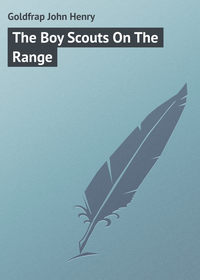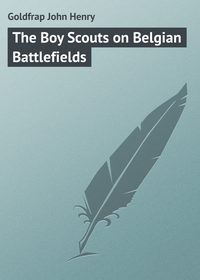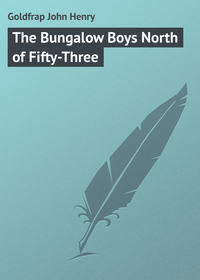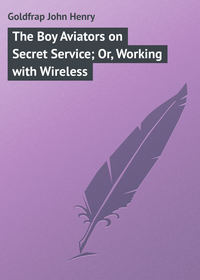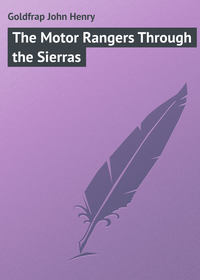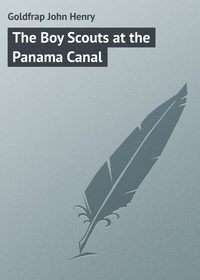 полная версия
полная версияПолная версия
The Boy Aviators in Nicaragua; or, In League with the Insurgents
With another vigorous nod of his head the Nicaraguan assented.
“It is your promise?”
“It is.”
“And you will keep it, as a man of honor and an officer?”
“Assuredly, Señor.”
“Then feel in my right-hand pocket and take out what you find there,” said Frank.
The officer plunged in his hand and drew it out with almost a cry of amazement when he saw the magnificent rubies that lay flashing their crimson fire in his brown palm.
“You see why I exacted such a solemn pledge from you,” said Frank, “such rubies as these might tempt any man to break his word.”
“But I am a Spaniard, sir,” proudly replied the young officer drawing himself to his full height.
Frank saw that he could trust him.
“You will deliver these to Señor Chester at La Merced,” he said, “and tell him that two are to be the portion of Señor Barnes, you understand, – one you will keep for your trouble.”
The officer replied that he comprehended his commission perfectly.
“And – and,” Frank hesitated; do what he could his eyes would fill with tears as he felt that he was making what would be his last request; “tell my father that we died like Americans and to break it to our mother as gently as he can. I think that is all – and thank you.”
The young officer seized the boys’ manacled hands and pressed them impulsively.
“Ever after this shall I respect Americans, Señor. Forgive me for what I have to do, – it is my duty. Your commission I swear to execute.”
With a sharp click of his heels he turned to the firing squad and stood at attention with his sword at his shoulder at one end of the line of twelve men.
The boys, standing side by side, heard the first command ring sharply out.
“Ready, – present!”
“Aim!”
“Good-bye, Harry,” whispered Frank.
“Good-bye, old fellow,” rejoined his brother. Each was glad to notice that there was not even a tremor in the other’s voice.
“Fi – ”
The command was never finished.
The firing squad, had their fingers on their triggers when, – with a crash that caused them to drop their weapons in sheer amazement, – a shell ripped through the roof of the garrison trial room from which Rogero stood sombrely watching them. It exploded the next moment with a force that showered the boys with splinters and debris and killed several of the firing squad outright.
All thought of the execution was forgotten in the mad panic into which the garrison was immediately thrown. Men rushed about and officers shouted commands, – the very suddenness of the attack seemed to have paralyzed the whole barracks. In the midst of the uproar and turmoil Rogero, – his face ablaze with hate and rage, – rushed into the courtyard. He had been unhurt in the damage the shell had done to the roof as it ripped through and was mad with fury. He struck right and left with the flat of his sword at the fleeing men and then, with a bellow of fury, made at Frank and Harry who, helpless and half-stunned by the explosion of the shell, had reeled back against the wall.
“Yankee pigs! You escaped the firing squad but I’ll run you through if it’s the last act I perform on earth;” he yelled, rushing at them with his drawn blade. The next minute it was struck out of his hand and he himself knocked sprawling by a blow on the point of the chin.
“That’s the ticket for soup,” the boys heard a well-known voice cry out, as their enemy measured his length; “and if you want any more, my fine rooster, we’ve got it on tap.”
“Ben Stubbs!” they cried out gleefully.
“Yes, and not forgetting one Billy Barnes of New York;” joyously shouted the young reporter, racing up to them, covered with dust, but yelling like a Comanche, “as soon as you’ve got that hardware off you we’ll have a talk-fest – I want to interview you, for the Planet.”
“What on earth has happened?” gasped the boys who only a few seconds before had made up their minds to die – and were still dazed at the amazing turn events had taken —
“Happened?” shouted Stubbs. “Well, shipmates, in a way of speaking about forty things has happened at once, – like they does in a four-ring circus. You twist yer head off looking fer ’em. In the first place me and Billy stole two mules, got up to La Merced right after I wrote that letter and told the folks of your plight, – and, here they come right now with the American consul.”
He pointed to the barrack gate where, pushing through the demoralized crowd of scared soldiers, came the well-known figure of Mr. Chester, followed by the stalwart Blakely, and Mr. Olivares the American Consul.
“Yes, but that shell,” demanded the boys, “which saved our lives.”
“Oh, that was our friend on the revolutionary gunboat at a little target practice I imagine,” grinned Billy Barnes. “I see it touched the spot,” he went on gazing about at the havoc and confusion.
And then further explanations were interrupted for a time while the boys and their father embraced and exchanged such greetings as may be imagined. It had been an anxious time for Mr. Chester and his lined face showed it.
“But thank heaven, it’s all over now, boys,” he exclaimed, “the United States has taken a hand in the mess.”
“What?” cried both the boys.
“Yes,” chimed in Mr. Olivares, “the Yankee and the Dixie, cruisers arrived off the town this morning with Rear Admiral Kimball and Lieutenant Commander Symington on board. They have orders from Washington to see that peace is at once restored even if Zelaya has to abdicate, – which he probably will in favor of Madriz,” he added – and after-events proved him correct.
“And on top o’ that,” exclaimed Ben Stubbs, unable to keep quiet any longer, “our friend Ruiz gave the government the licking of their young lives at Bluefields yesterday and steamed down here on his gunboat just in time to fire that shell and throw a scare into the spiggtys at the very physicky moment,” – Ben meant psychological moment.
“Does his wife know that General Ruiz is safe?” asked Harry eagerly, after the boys had related how they became leagued with the insurgents.
“Yes,” replied Mr. Chester, “the news was brought by a runner who managed to get through Rogero’s lines two days ago. Poor woman, she swooned when she heard the news; but now she is perfectly recovered and will be here with Don Pachecho to meet him shortly.”
All this time Billy Barnes had been mysteriously missing. Suddenly, however, he reappeared, accompanied by two staunch sergeants-of-marines from the Dixie, leading between them a crumpled, despicable figure that even the boys, who had good cause to remember him, had some difficulty in recognizing as that of General Rogero. If it had been another man his condition would have been pitiful. As it was, nobody felt much sympathy for him.
“Well, we got him;” exclaimed Billy triumphantly, “caught him sneaking into the hotel. Now, Mr. Consul, I want to turn this man over to your custody as the murderer of Dr. Moneague, who is wanted for that crime by the New York police. I’ll just leave him here till I telegraph to my friend Detective Connelly and file the story for my paper – it will be a crackerjack.”
He hurried off, leaving Rogero between his two guards, – facing a group from none of which he had any right to look for mercy. His army had evacuated Greytown in a hurry on the arrival of the American cruisers, as no one of the officers wanted to put himself in the position of taking up arms against the American government. Rogero was therefore alone, – and guarding the town that he had entered in triumph not so very long before, lay a revolutionary gunboat and two trim Yankee cruisers.
“Well,” he said bitterly, “you have me cornered but it’s not my fault that I didn’t finish off those cubs there before you did.” He indicated Frank and Harry. The boys turned away. It was not in their nature to exult over a fallen enemy.
“I know there is one possession of mine which you intend to have if you can succeed in fixing this trumped up charge of murder on me and that is this – ” he went on as he drew out a bit of parchment from an inner pocket. “I’ll foil you, – thus,” he exclaimed suddenly and tore the plan of the Toltec treasure trail into a thousand atoms.
“Werry pretty I must say,” spoke up Ben Stubbs, “but a waste of time, ship-mate, – that hole into the treasure cave is filled up by the airthquake and the only way to get at the mines will be in another airship.”
Rogero’s face was a study.
“What, you forestalled me there, too?” he muttered savagely.
“Well I reckon these boys did that,” cheerfully replied Ben, “and thereby saved me from a maroon’s grave.”
Rogero’s rage was frantic when he learned this. He snapped his teeth with impotent fury as he was led off to a cell to await the arrival of extradition papers from New York. It might as well be said here that he never reached there. A few hours after he was placed in the cell he, – through some attendant who was faithful to his wishes to the last, or whom, as was more probable, he had bribed, – obtained a phial of poison. When next his cell was visited by the guard the tempestuous general of the Zelayan forces was finished with his earthly battles and had been dead some time.
The boys’ irons were struck off as soon as a blacksmith could be found in the panic-stricken city, and that evening they sat in the places of honor at a gay banquet given to the officers of the two cruisers by Mr. Chester and the American Consul, at the hotel where their adventures in Nicaragua had begun. While the festivities were at their height a servant hastened in and whispered to Frank that a man wanted to see him outside.
In the hall Frank found a ragged-looking fellow awaiting him who held in his hand a skin-bag.
“You are the Señor Chester?” he asked.
“Yes,” replied Frank.
“Don Alejo he tell me give you dees,” said the figure and abruptly vanished. Inside the bag lay all the ten rubies and with them a short note.
“You see that a Spaniard can keep his word as well as an American his courage, – I do not need the ruby you offered me,” was all it said.
On his return to the banquet room Frank was compelled to tell in detail all their adventures to the intense interest of the officers and of Admiral Kimball. A buzz of admiration went round the table from time to time as he modestly related their perils and mishaps.
Early the next day Admiral Kimball sent for the boys on board the Dixie just as Frank and Harry were congratulating General and Mrs. Ruiz on their happy reunion and thanking the former for his speedy voyage down the coast to their rescue.
“I have been much impressed with your courage and adroitness,” said the admiral, when they were closeted with him in his private cabin, “and I believe you are just the boys the government want for a particularly perilous and dangerous mission, – will you undertake it?”
The boys eagerly pressed him for details, which he gave, while their eyes shone at the opportunities he unfolded to them for fresh adventures and feats in a newer, greater aeroplane than even the Golden Eagle.
What the Government’s special air-ship assignment was and how the boys, – despite hardships and danger, – carried it through to a successful conclusion will be told in the next volume of this series: – THE BOY AVIATORS ON SECRET SERVICE; OR, WORKING WITH WIRELESS.
THE END1
S. O. S. is now the wireless distress call. C. Q. D., the former tocsin having being used by too many would-be humorous amateurs to make its continuance advisable. —Author’s note.




